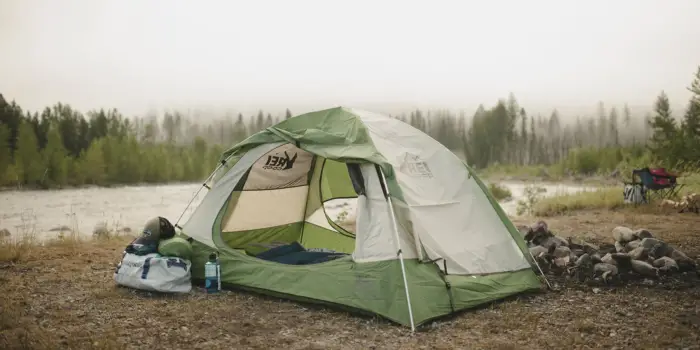How heavy a tent is, depends on the adventurers’ trip, which determines the amount of load they travel with. The adventurer is the one who determines the weight of a tent outside the base weight.
There’s no generally approved backpacking weight. However, there is a recommended weight that your loaded backpack should be. Read on to find out.
Here’s how to know how heavy a tent should be for backpacking:
The total weight of your loaded backpack shouldn’t weigh more than 20% of your body weight, while for day hiking, the total weight of your loaded backpack shouldn’t weigh more than 10% of your body weight.
The picture below clearly illustrates a couple who are backpacking in the woods.

According to research made available by the American Hiking Society, more than 9 million Americans backpack yearly.
Backpacking is common in the U.S; therefore, the recommended weight for you to have less stress hiking is to ensure the weight of your tent is about 20% of your body weight.
How Heavy Should a Tent Be For Backpacking? (Best Calculation)
Going by the above statement, how heavy a tent should be for backpacking is the total weight of your loaded backpack equal to 20% or less of your body’s total weight.
The above is a guaranteed way that will help you to know the weight of your backpack.
If a person weighs 85 pounds, for example, then the backpack weight shouldn’t be more than 17 kg. This means everything that will be inside the backpack, including the base weight, shouldn’t be more than 17kg.
However, when you’re on day hiking, your loaded backpack should weigh 10% or less of your body weight (e.g., a person that weighs 85 pounds should carry a backpack that weighs approximately 8.5 kg).
This is because day hikes are strenuous. They require a lot of trekking, which may be for quite a distance while backpacking.
Even though it’s difficult to tell an individual’s tent weights when they’re going hiking because of the different types of tents out there and the way each person packed their load, this method will guide you to know the weight of your tent for backpacking.

Also, to know the exact weight of your tent before hiking, you have to scale your tent with a digital scale.
A digital scale will help you know how heavy your tent is. The scale will guide you on what will be inside your backpack when packing — so you don’t exceed the recommended 20% suggested weight.
Factors to Consider When Packing For Hiking
When going hiking and camping, there are three major factors to consider for you to have free movement with your backpack.
a). The Duration of Your Trip: How many days is your hiking? The number of days is what determines the amount of food, water, and fuel you will travel with. This will guide you on how to pack your tent.
Even though it’s a multi-day adventure, some hikers want their backpack close to 20% of their body weight. Don’t forget to create space for clothes and some other things that you will go with you.
b). The Season: The season you’re when embarking on hiking also determines the type of tent you go out with.
Assuming you’re heading out at a very cold temperature, you’ll need to get warmer heavier clothing and gear than when you’re trekking in sunny summer weather.
c). Your Travel preference: The level of comfort you envisage before you embark on a hike is what determines the things you travel with.
Some people value their comfort at the camp and are willing to accept the inherent weight that comes with hauling in luxuries like a hammock, extra clothes, and a thick, cushy sleeping pad.
Others are okay with wearing the same clothes for days on end and sleeping on a lightweight pad.
How to Keep Your Backpack at Bearable Weight
The importance of hiking with less weight can’t be over-emphasized. Hackers know the value of carrying a backpack with less weight for camping.
However, the essential things you need for hiking can’t be left behind, while you’re trying to reduce the weight you carry.
In order to have a less heavy backpack, there are still some essentials (e.g., first-aid kit, clothes, food items, and sleeping materials), you need that will give you a pleasurable camping experience.
You can still have those essentials listed above and also a less-heavy backpack when you’re going hiking.
Let’s quickly look at how to keep your backpack at a bearable weight when hiking.
How to Reduce Backpack Weight
At this point, you may be asking, “how do you reduce the weight of your backpack.” This is what I am about to show you, read on.
Meanwhile, since you have the knowledge of how much your backpack should weigh and how to arrange it, then let me show you proven ways how to reduce the overall backpack weight.
What’s Your Base Weight?
The base weight of your tent is the weight of your loaded backpack, excluding consumables like food, water, and fuel.
Knowing your base weight is very important; other essentials are variables that have decreasing weight as the journey proceeds. Base weight remains constant and is what you will move with all through your camping.
It’s your duty to reduce your loaded backpack’s weight so you can have an enjoyable outdoor all through your hiking.
One of the ways to reduce backpack weight is to travel with valuables that have lightweight such as sleeping bags, water filters, and clothes.
Every year lightweight backpacks are produced, though, they’re quite expensive.
If your base weight is 20 pounds, get a lightweight backpack, and when it’s 10% pounds, go for an ultralight backpack. This will keep your tent base weight in a pleasurable state.
Therefore, it’s important to know your backpack’s base weight, so that it can guide you when planning the next hike.
What’s Your Gear Weight?
The knowledge of your gear weight will enable you to make a better preparation — this also will help you to make a decisive plan on how heavy your tent should be for backpacking.
Do you know that wet clothes are heavier than dry ones? Yes, it is. That’s why backpackers prefer dry clothes to wet ones.
Get your clothes dried up before going for camping to reduce the weight of your tent.
Use a scale to weigh every item you want to pack into your backpack. The precise weight of each item will help you to have a better plan on which item to go with. Those items will make up the backpack weight.
Do Away With Unnecessary Duplication Of Items
Most Backpackers prefer to go with a few items whenever they are going hiking. This process reduces the weight of the tent.
Hiking doesn’t require many clothes, a pair of each item is good to go on.
The only item that might require duplication is your pair of socks and underwear, and the backup top is all that you might likely need for multi-day camping during cold or warm weather.
As much as you want to reduce weight, don’t forget to bring along your raincoat or bivy pack to provide protection from the wind and cold.
So, any item that can increase the weight of your backpack that you might not need during hiking — do away with them. This will give you a sizable weight during hiking
Get a Lighter Gear
Backpackers who know what it means to have a memorable hiking adventure always go for the lighter backpacks as soon as they are available in the market.
Ideally, if both your tent and backpack weigh about 3 pounds or even lesser, it will be nice. Though, there are some other items you may not leave behind, such as a sleeping bag, sleeping pad, backpack, and tent.
You will enjoy your hiking when you are bundling with a backpack that’s not too heavy.
Plan Your Meal
Do you know that many backpackers ignore this important aspect of reducing weight when planning out their movement?
Planning out your meal will save you from a lack of chocolate and reduce the bag’s weight. Take time to plan out your meal ahead of time.
Take a moment to write down your meal for each day. This will save you from overloading your bag with one particular food.
According to REI, each person is to take 1.5 to 2.5 pounds of food (or 2,500 to 4,500 calories) per day, depending on the size, weight, and exertion level.
The above research reviews how much food you need to carry for your hiking to reduce the weight of the backpack. Know the size of your body, the weight, and the exertion level, and this knowledge will guide you in preparing for your adventure.
Oftentimes, having an idea of a tent’s initial weight before packing for backpacking, will go a long way to save you from stress.
On this note, I bring to your understanding the various types of tents with their weight that will help you plan out your camping.
There are different categories of tents based on their specific weights. The average weight of a tent ranges between 1 lb., 11 ounces, and 6 lbs. The table below shows categories of tents with their weights in pounds.
| Name of Tent | Ranges of Weight In Pounds |
| Ultralight tent | 1 and 2 |
| Lightweight tent | 3 and 4 |
| Standard Backpacking tent | 5 and 7 |
Conclusion
Bear in mind that whatever the weight of your tent is, it shouldn’t be 20% less than your body weight.
Now that we know the limits of how much our backpack should weigh and the essential items we’ll likely need — let’s run over what we can do to reduce our overall load.
To reduce the overall backpack weight, follow the way stated in this article.
You are the one who determines how heavy your tent should be because the base weight is constant while the other weights can be managed.
Therefore, to determine how heavy your tent should be, make sure you don’t allow your loaded backpack to exceed more than 20% of your body weight.
Let your body be the standard you use to know how heavy your tent should be since the recommended weight is constant.

